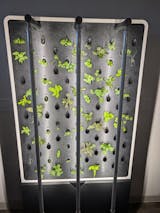What is Vitamin K?
Vitamin K is the (k)hameleon of the Vitamin world - it can have drastically different purposes dependent on the circumstances. For example, its unique structure is important for plants during photosynthesis. People don’t need to photosynthesize, however, but Vitamin K is still necessary for good health in other ways. Like Vitamin D, Vitamin K is fat-soluble. As it is required by plants during photosynthesis, big leafy green vegetables are a great source of Vitamin K. The most notable forms of Vitamin K are K1 (from plants) and K2 (from animal products). Most dietary guides include both forms in their assessments for Vitamin K as part of a healthy diet.
Why does it matter?
- Vitamin K plays an essential role in healthy blood clotting. Normally, when you get a nosebleed or a cut, your blood coagulates (clumps together) to help prevent further bleeding. This is an observable action that results from healthy blood clotting. Without blood clotting, you'd uncontrollably bleed out.
- Vitamin K deficiency in adults is relatively rare due to the wide array of plentiful sources. However, Vitamin K deficiency in newborn children can lead to brain damage or death if left untreated. Thankfully, newborns are typically monitored for blood abnormalities that would indicate such a deficiency - meaning that any issue is usually quickly diagnosed and treated.
- Vitamin K is required for the modification of osteocalcin in bones, a protein hormone made in bones that acts on a variety of tissues. Beyond abnormal bleeding, the research on how Vitamin K specifically affects health and disease is mixed and relatively sparse.
Where can I find Vitamin K?
Vitamin K is typically found in a wide array of plant products such as swiss chard (830μg/100g), spinach (483μg/100g), and kale (390μg/100g).
Dried basil (1715μg/100g) and fresh parsley (1649μg/100g) are also Vitamin K-rich sources but since they are taken in such small quantities, they do not provide big contributions to overall Vitamin K intake. On the other hand, meat products like chicken breast (4.3μg/100g) contain Vitamin K in much lower quantities. Vitamin K from animal products are by-products of the different bacteria found in the animal rather than the animal itself.
Daily recommended intakes:
Adequate intakes are established if there is no evidence for a recommended daily intake and, therefore, vary depending on the advising body. Here are some recommendations for healthy adults across the world (Numbers may vary for those with specific deficiencies, pregnant women, children, etc.):
To Wrap It Up
Although Vitamin K deficiency is relatively rare due to its presence in a variety of foods, deficiency can (and does) occur based on certain circumstances. People with gastrointestinal disorders may have difficulty absorbing Vitamin K and require more of it in their diet. Conversely, while Vitamin K may help your blood clot, some people may be on blood thinners for other medical conditions. This may mean that people using blood thinners need to restrict dietary Vitamin K to help prevent any unintended reductions in the efficacy of medications.
Fun Fact
Vitamin K was found when chickens on fat-free diets developed bleeding issues. Cholesterol plus one other purified component was added back to the diet. This purified component was called Vitamin K, or coagulation vitamin (Koagulationsvitamin in German).
Because bacterial metabolism is a good source of Vitamin K, patients who are on oral antibiotics could lose some of their normal Vitamin K intake and become deficient.

